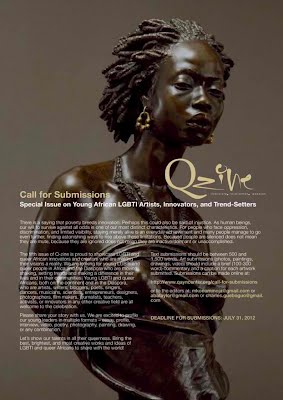My Mind Words Paper:
africa literature
Call for Books by Women about African Women: The Aidoo-Snyder Book Prize 2012 (free to enter | $500 prize)
Short Story Day Africa YA Short Story Competition for Ages 17 and Below (Africa-wide)
Black Letter Media and Poetry Potion are Looking for Short Stories and Poetry for an Upcoming Anthology (Africa-wide)
Short Story Day Africa Competition (Africa-wide)
Call for Papers: What is Africa to me now? The Continent and its Literary Diasporas (International Conference at University of Liège, Belgium)
Cecil B. Currey Book Award 2012 (Third World topics are accepable)
The Toyin Falola Africa Book Award 2012 (for the best book on Africa | $500 cash award)
Deadline June 11 | Call for Critical Essays - N. Paradoxa International Feminist Art Journal (Africa-wide)
Deadline June 10 | The WAN-IFRA African News Innovation Challenge (grant value: $12,500-$100,000 | Africa-wide)
Ugreen Foundation's Creative Wings Short Story Prize 2012 (Nigera/ Africa-wide)
The $3,000 African Liberty Essay Competition (Africa-wide)
Call for Submissions for QZine: Special Issue on Young African LGBTI Artists, Innovators and Trendsetters

Call for Papers on Francophone African Literature: New Readings Journal Volume 13
Call for Papers: Counter-Cultures in Contemporary Africa Volume 8 Number 1
Climate Change Media Partnership Fellowship (developing countries)
Fiction Manuscript Submission Schedule: Parresia Publishers (Nigeria/ Africa-wide)
Deadline May 31 | Fully Funded: The Reham Al-Farra Memorial Journalists Fellowship Programme 2012 for Journalists from Developing Countries
Deadline May 31 | Call for Submissions - Afrofutures: a New Anthology of Science Fiction by African Writers
Deadline May 31 | The 6th Annual African Network Annual Awards for Excellence in HIV /AIDS Communication in Africa
The African News Innovation Challenge